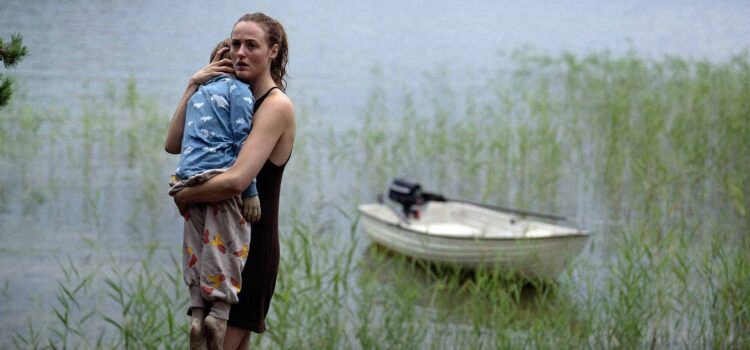Playing as part of the Webster Film Series
By Alex McPherson
A meditative reflection on death and grief, director Thea Hvistendahl’s “Handling the Undead” is a somber and richly atmospheric experience that eschews traditional thrills to make pertinent statements about the need for love, connection, and perseverance in a broken world.
Based on John Ajvide Lindqvist’s 2005 novel of the same name, the film centers follows three families in modern-day Oslo, as their recently-deceased loved ones rise from the dead suddenly and without explanation.
There’s Anna (Renate Reinsve), a single mother grieving the loss of her young son, Elias (Dennis Østry Ruud). Anna goes about her days in a robotic, depressed haze and is prone to suicidal ideation. She has a strained relationship with her father, Mahler (Bjørn Sundquist), who wants to help Anna but doesn’t know how. When visiting the graveyard where Elias is buried, Mahler hears knocking coming from Elias’ casket underground, and he brings Elias’ reanimated body back home.
There’s David (Anders Danielsen Lie), an aspiring stand-up comedian living happily with his wife, Eva (Bahar Pars), and their children Kian (Kian Hansen) and Flora (Inesa Dauksta). Eva dies suddenly in a car accident on the eve of Kian’s birthday, and she returns to life in the hospital shortly thereafter; back, but not quite the same.
Finally, there’s the elderly Tora (Bente Børsum), who is rejoined by her late wife (Olga Damani) after returning home from her funeral. Her confusion shifts to happiness then to a different sort of grief, as she reckons with the reality that her wife, as she knew her, is gone.
Indeed, in its patient, quietly heartbreaking rhythms, “Handling the Undead” is a decidedly different kind of zombie film, inviting viewers into the throes of characters’ anguish and desperation with an unflinching eye that offers no easy answers. Without resorting to melodrama, Hvistendahl’s film pulses with a existential dread, a heaviness that blankets nearly every frame, as we watch these vulnerable people navigate the unthinkable in an empty metropolis, reduced to primal instincts for love that supersede logic.
With its mostly non-sensationalized approach, “Handling the Undead” is less about the zombies themselves than what they mean to those they impact. Driven by love, loyalty, and protectiveness, we see each group of characters struggling to hold onto what’s been lost, unwilling/unable to let go of what’s no longer their reality in an isolating, compartmentalized world.
Editors Thomas Grotmol and Trude Lirhus let scenes breathe, lingering on sensitive yet shattering performances that reflect the weight of grief that each character bears. Hvistendahl doesn’t spend much time giving backstory, trusting viewers to pay attention and connect with them as ordinary people grappling with tragedy and, eventually, working towards some semblance of inner peace.
Hvistendahl’s understated approach works well here, emphasizing silence and unspoken pain in a manner that’s far more authentic and believable than other films of its ilk. Thanks to exceptional turns from the whole ensemble (Reinsve, especially, as a mother sacrificing much to protect the child she couldn’t protect before), “Handling the Undead” conveys its somber story efficiently, stripped down to its raw, emotional essence.
The zombies themselves, too, are treated empathetically. Sure, they’re definitely capable of violence (they are zombies, after all), but the truly chilling aspect of them here is their warped emptiness: the people they once were are unable to communicate in their new vessels.
The characters’ sense of isolation and emotional turmoil is reflected in Pål Ulvik Rokseth’s cinematography, which positions each family within a concrete desert. Everything is connected but, simultaneously, nothing is at all, which calls to mind still-fresh memories of 2020 lockdown. The Oslo that surrounds these characters further emphasizes just how important these characters’ bonds are to each other, making it almost impossible for them to accept the cruel hand of fate.
Suffice to say, “Handling the Undead” is quite a heavy watch, lacking much in the way of levity or “fun” moments of suspense that comprise most other zombie films. In place of that, however, Hvistendahl targets truths that hit home on a deep level.
While “Handling the Undead” is a raw look into the depths of grief, it’s just as much a testament to the beautiful-yet-conflicted human spirit, and about the importance of accepting the past, no matter how painful it is, and finding our own way in a world that feels overwhelmingly bleak but still has the capacity for hope. For adventurous viewers, it’s not to be missed.
Rating: A-
Alex McPherson is an unabashed pop culture nerd and a member of the St. Louis Film Critics Association.

